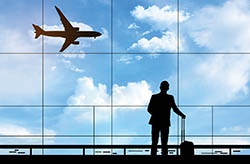
f you and your employees will be traveling for business this year, there are many factors to keep in mind. Under the tax law, certain requirements for out-of-town business travel within the United States must be met before you can claim a deduction. The rules apply if the business conducted reasonably requires an overnight stay.
Note: Under the Tax Cuts and Jobs Act, employees can’t deduct their unreimbursed travel expenses through 2025 on their own tax returns. That’s because unreimbursed employee business expenses are “miscellaneous itemized deductions” that aren’t deductible through 2025. Self-employed individuals can continue to deduct business expenses, including away-from-home travel expenses.
Rules that come into play
The actual costs of travel (for example, plane fare and cabs to the airport) are generally deductible for out-of-town business trips. You’re also allowed to deduct the cost of lodging. And a percentage of your meals is deductible even if the meals aren’t connected to a business conversation or other business function. For 2024, the law allows a 50% deduction for business meals.
No deduction is allowed for meal or lodging expenses that are “lavish or extravagant,” a term that generally means “unreasonable.” Also, personal entertainment costs on trips aren’t deductible, but business-related costs such as those for dry cleaning, phone calls and computer rentals can be written off.
Mixing business with pleasure
Some allocations may be required if the trip is a combined business/pleasure trip; for example, if you fly to a location for four days of business meetings and stay on for an additional three days of vacation. Only the costs of meals, lodging and so on incurred during the business days are deductible — not those incurred for the personal vacation days.
On the other hand, with respect to the cost of the travel itself (for example, plane fare), if the trip is primarily for business purposes, the travel cost can be deducted in its entirety and no allocation is required. Conversely, if the trip is primarily personal, none of the travel costs are deductible. An important factor in determining if the trip is primarily business or personal is the amount of time spent on each (though this isn’t the sole factor).
Suppose a trip isn’t for the actual conduct of business, but is for the purpose of attending a convention or seminar. The IRS may check the nature of the meetings carefully to make sure they aren’t vacations in disguise, so retain all material helpful in establishing the business or professional nature of this travel.
Also, personal expenses you incur at home related to the trip aren’t deductible. This might include costs such as boarding a pet while you’re away.
Before you hit the road
Contact us with any questions you may have about travel deductions. We can help you stay in the right lane.
Sidebar:
Is your spouse joining you?
The rules for deducting the costs of a spouse who accompanies you on a business trip are very restrictive. No deduction is allowed unless the spouse is an employee of yours or of your company. If that isn’t the case, then even if there’s a bona fide business purpose for having your spouse make the trip, you probably won’t be able to fully deduct his or her travel costs (though you can deduct some costs).
Specifically, the restrictions apply only to additional costs incurred by having your non-employee spouse travel with you. For example, the expense of a hotel room or for traveling by car would likely be fully deductible since the cost to rent the room or to travel alone or with another person would be the same, even in a rented car.